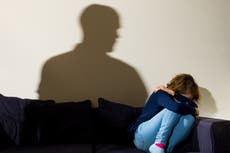Government’s plan to tighten rules on ‘at-home abortions’ revealed
Exclusive: ‘It will force women in marginalised positions to make unnecessary journeys to abortion clinics, and risks them starting to bleed before they reach home,’ expert warns

The government wants to curb access to “at-home abortions”, a leaked document has revealed.
An email sent to abortion providers, exclusively shared with The Independent, warned those seeking abortions must not be given pills to take at addresses they do not reside at, such as family homes, refuges or hotels.
The plans would essentially block women from taking pregnancy termination pills at addresses that are not their homes.
Campaigners said the government’s guidance will “disproportionately” impact vulnerable women such as domestic abuse victims who could have to return to abusive partners for the tablets.
The email, sent by the Department of Health and Social Care on Tuesday, states: “We want to bring to your attention and confirm that addresses such as hotels or family/friends of non-residents are not classed as ‘homes’ and abortion pills (whether first or second) must not be provided to these places under any circumstances, including in-person collection taken away for use at a non-resident address.
“It is essential that procedures and safeguards are in place to prevent this happening to ensure full compliance with the provisions of the 1967 Abortion Act. Please cascade this information to your staff.”
Jonathan Lord, co-chair of the British Society of Abortion Care Providers, told The Independent the “guidance is disappointing and shows why the law is not suited to control women’s healthcare”.
Dr Lord, consultant gynaecologist at the Royal Cornwall Hospitals NHS Trust, added: “There is no legal definition of ‘home’, and this interpretation means that women who are in an abusive relationship and seek sanctuary from a violent partner in a refuge could be denied safe, effective abortion care.
“They would be forced to either return home to their abuser, or have to travel twice to take the tablets in a clinic or hospital and risk travelling and miscarrying on public transport.
“Many people are forced to live in hotel accommodation given the lack of affordable social housing, and others may choose to book a hotel for privacy or to stay with supportive friends or family.”
After Covid hit the UK in March 2020, ministers allowed abortion pills to be sent via post to be taken at home after a phone consultation, with the UK’s largest study into abortions finding at-home early medical abortions pose no greater risk and allow women to have the procedure much earlier on in their pregnancy.
Before the pandemic, getting the first abortion tablet, mifepristone, required a visit to an abortion clinic. Having a medical abortion involves taking two tablets.
Dr Lord said he hoped Maria Caulfield, the new minister for women, who has been granted ministerial responsibility for abortion care in the UK, will be “sympathetic to the needs of these vulnerable groups and not seek to impose regulations that would deny them access to compassionate abortion care”.
The consultant, also medical director of MSI Reproductive Choice, a leading UK abortion provider, added: “The only permanent solution is for abortion to be decriminalised, so that decisions about the most appropriate treatment and care can be made by clinicians and their patients, rather than by politicians or a law that dates back over 55 years”.
Abortions are still deemed a criminal act in England, Scotland and Wales under the 1967 Abortion Act. Legislation passed in 1861 means any woman who ends a pregnancy without getting legal permission from two doctors, who must agree that continuing with it would be risky for the woman’s physical or mental health, can face up to life imprisonment. Any medical professional who delivers an abortion out of the terms of the act can face criminal punishment.
Commenting on the leaked email, Dr Pam Lowe, a sociologist who specialises in women’s reproductive and sexual health, told The Independent: “The lack of flexibility in the policy is likely to have arisen from the government’s unwillingness to allow pills by post.
“It also shows an institutionalised distrust of healthcare professionals, who are prevented from using their clinical judgement to ascertain whether or not specific living circumstances are suitable.
“It will force women in marginalised positions to make unnecessary journeys to abortion clinics, and risks them starting to bleed before they reach home.”
The Independent recently reported on how the prime minister and senior members of his government have voted against boosting access to abortions or have opted out of key votes on terminations.
Anneliese Dodds, shadow secretary of state for women and equalities, raised concerns about the voting records of top ministers as she warned women around the UK will be “really worried”.
More than a third of the government’s current cabinet voted against early medical abortion at-home measures rolled out in the wake of the pandemic being made permanent.
Raising concerns about the leaked email, Kerry Abel, chair of Abortion Rights, a UK campaign group, said: “Part of the evidence put forward for the need for telemedicine and early medical abortion pills at home was to deal with many socio-economic barriers that prevented some women and pregnant people from accessing safe abortions.
“This particularly affected women in domestic abuse situations who may not be able to add their home address for fear of reprisals. Abortion care works best when it meets the needs of all patients who have a right to access abortion services. These exceptions roll back important work to ensure abortion is accessible.”
Ms Abel noted the guidance would impact “those living in hostels and refuges as well as those who are being temporarily housed in hotels” - adding the measures “will have a knock-on impact on students and seems designed to specifically target the most vulnerable”.
She added that the guidance will “disproportionally affect poorer people and women of colour”, adding: “Abortion Rights’ concern is that a government that harbours many with a record of anti-choice views in the cabinet is seeking to U-turn on something already agreed in parliament and has been in force since 2020.”
Ms Dodds previously argued the appointment of Ms Caulfield as minster for women poses an “extremely concerning” threat to women’s rights.
Ms Caulfield, the Conservative MP for Lewes, has previously suggested curbing the 24-week abortion time limit. She has also been criticised for claiming that babies born at 18 weeks “grow up to live long, healthy lives like the rest of us” – an assertion that was rejected as “simply untrue”.
Ms Caulfield is a former officer of the all-party parliamentary pro-life group and voted against legalising abortion in Northern Ireland. Abortion was banned in almost all circumstances, even in pregnancies resulting from rape and incest, with women who sought terminations facing life imprisonment until the procedure was legalised in Northern Ireland in October 2019.
Join our commenting forum
Join thought-provoking conversations, follow other Independent readers and see their replies
Comments




Bookmark popover
Removed from bookmarks